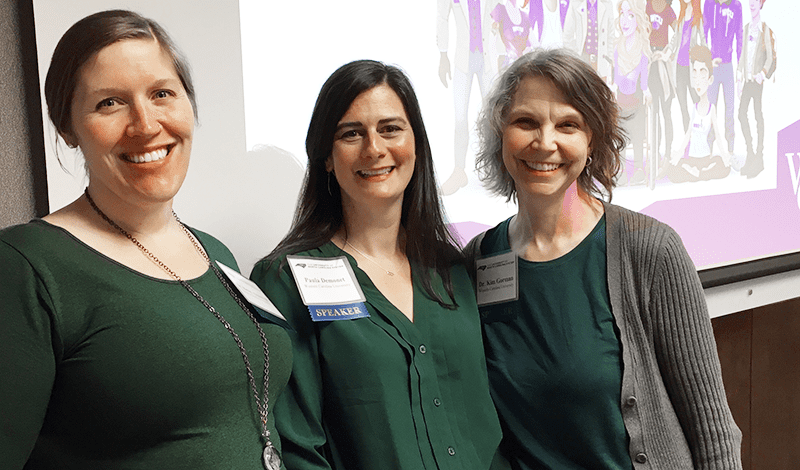
Conference Spotlights Behavioral Health Strategies Across the System
When Chase Holleman was a student at UNC Greensboro, he faced what could have been an insurmountable obstacle on his path toward graduation: substance use. Confronted with the seemingly endless temptations available on a college campus, Holleman turned to UNC Greensboro’s Spartan Recovery Program (SRP) for the support he needed to stay in recovery and refocus his energies. SRP helped him to accomplish his primary goal: graduation.
“SRP gave me my voice. It completely transformed my life and shaped my entire career path. … SRP unlocked something in me that developed my confidence, leadership ability, and potential for growth,” he said.
On February 6, 2019, more than 200 faculty, staff, and students—representing all 17 UNC System institutions—gathered to share innovative behavioral health strategies that are creating countless student success stories like Holleman’s.
The UNC System’s 2019 Behavioral Health Convening kicked off with a presentation by Dr. Daniel Eisenberg, director of the The Healthy Minds Network for Research on Adolescent and Young Adult Mental Health (HMN). Eisenberg, whose scholarly background in economics eventually led to his intensive work in behavioral health, emphasized that supporting behavioral health services is an investment. Helping our students overcome the challenges they face today has a personal and an economic impact that will ripple outward well into the future.

Holleman’s story drives this point home, literally. Because of UNC Greensboro’s behavioral health initiative, he and many, many others like him have succeeded as students and as productive graduates. They aren’t just thriving as individuals. They are also contributing to the wellbeing and economy of the entire state.
Getting Stronger, Together
In his mid-afternoon remarks to attendees, UNC System Interim President William L. Roper underscored that it’s the collaboration across the System that makes University efforts so potent.
“We are stronger together … and this conference is one way we can learn together,” he said.
This emphasis on collaborative thinking captured one of the conference’s central undercurrents. The diversity of attendees, panel presenters, and topics made it clear that there is indeed an extraordinary, multi-pronged effort across the System to address a wide array of behavioral health challenges and opportunities.
“We are stronger together … and this conference is one way we can learn together”
Student, faculty, and staff panelists discussed ways to support populations with unique challenges: first-year students, students who represent the full range of sexual and gender identities, veterans, athletes, and graduate students confronting the stress of writing their dissertations.
The conference didn’t overlook the necessity of supporting the providers, either. Some panels dove into approaches to “helping the helpers.” Others explored the unique needs of faculty members.
One panel specifically focused on Hurricane Florence’s impact on the behavioral health of students, faculty, and staff alike.
In between sessions, therapy dogs were on site, no doubt helping to alleviate the stage-fright butterflies some presenters were probably experiencing.
All told, each institution’s efforts are individually remarkable. But the conference exemplified what happens when these institutions pool their ideas. When these best practices get adapted and scaled up across the System, the impact throughout the state will be extraordinary.
Multimedia Wellbeing
A recurring refrain over the course of the day addressed the challenging logistics of improving services without overstretching resources and depleting budgets. The key to doing more with less? Collaboration.
Western Carolina University’s Counseling and Psychological Services center wanted to encourage more students to pursue wellness strategies and to seek out help, but counselors were anxious that a dramatic increase in demand would overtax their capacity. They concocted a particularly colorful solution to the dilemma.

Dr. Betsy Aspinwall, Dr. Kimberly Gorman, and Paula Demonet–all representing WCU’s Counseling and Psychological Services center – explained that virtually every student would benefit from some behavioral health guidance. At the same time, not every student needs the same level of intensive, individual consultation.
So, the center enlisted the help of Eric Smith on the university’s IT Support team to produce a series of wellness videos. These short, creative bursts of information have been designed to help students develop the skills to tackle some of the challenges associated with student life.
Even the athletics program got involved: the mascot Paws eagerly volunteered to model a variety of wellness best practices in the videos. Paws demonstrated how to use exercise to relieve stress and was even brave enough to get a physical at the campus health clinic.
The center also collaborated with Carol Barnao, visual arts specialist for Student Affairs at WCU, to create an illustrated series of student avatars. Today, this motley crew of so-called “mountain hipsters” make appearances in the films and on kiosks throughout campus, where they encourage students to “take care of themselves.”
In essence, WCU’s counseling team created a multi-media promotional campaign to direct students to brush up on their “Wellness 101” by visiting the center’s video channel on YouTube and seeking out personalized help on campus.
The presenters underscored how marketing logic was central to their plan’s success. The cartoon avatars were conceived and heavily promoted as the face of the center’s “brand.” The mountain hipsters have helped destigmatize counseling and psychological services. They have also brought the university’s wide assortment of wellness services to the forefront of the Catamount mind.
This approach, when coupled with the wellness center’s careful assessment protocols, has delivered core wellness coaching to more students, while simultaneously freeing up counselors to work more closely with those who need individualized attention.
Building Behavioral Health Capital
The conference’s emphasis on business approaches, which treat behavioral health as an investment that can be branded and marketed, might at first seem counter-intuitive.
But investing in student behavioral health does have a quantifiable long-term economic impact. As Eisenberg explained in his opening remarks, studies show that 30 percent of depressed college students will drop out. With treatment, six percent of these dropouts can be averted. If a counseling center works with 500 students, this investment will generate more than $3 million in lifetime earnings.
More significantly, investing in behavioral health buys the future. Tellingly, UNC System Senior Vice President for Academic Affairs Kimberly van Noort framed the convening by emphasizing how the University is a business … but one whose end goal is transformation not profits.
“We’re in the business of changing lives,” she said, passionately quoting WCU’s late and much-beloved Chancellor David Belcher.
UNC Greensboro’s SRP program transformed Holleman’s life. It gave him the support he needed to complete his degree, which opened the door to a whole world of professional and personal opportunities. Presenters Dr. Jennifer Whitney and Terri Spears were clearly emotionally choked up as they tallied all of Holleman’s accomplishments.
Since graduating from the university, he has earned a Master’s in social work from UNC-Chapel Hill. He conceived of and implemented a successful and widely heralded naloxone distribution program in High Point. He co-founded CURE-Triad, a non-profit alliance dedicated to fighting substance use. Today he is the lead navigator for GCSTOP (Guilford County Solution to the Opioid Problem) and the recipient of several awards that honor his tireless community service, including one from the Greensboro Community Foundation and one from the NC Attorney General’s Office.
When UNC Greensboro dedicated the resources, time, and money keeping Holleman on the path toward graduation, these efforts weren’t just securing his future. The university’s investment was growing the leadership North Carolina needs to secure its future as well.
The Behavioral Health Convening made it clear that this level of investment is taking place at 17 UNC System institutions, transforming lives in all 100 counties in the state.